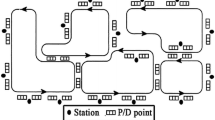Abstract
The automated guided vehicles (AGVs) are extensively applied for material handling operations in the flexible manufacturing system (FMS) facilities. The scheduling decisions for the multi-load AGVs serving in the FMS with minimum travel time, waiting time and time to serve jobs are highly significant from the sustainable profits point of view. The present study proposes a combination of particle swarm optimization (PSO) for global search and memetic algorithm (MA) for local search termed as the modified memetic particle swarm optimization algorithm (MMPSO) for scheduling of multi-load AGVs in FMS. The newly proposed algorithm is applied for the generation of initial feasible solutions for scheduling of multi-load AGVs with minimum travel and minimum waiting time in the FMS. From the computational experiments, it is observed that the proposed MMPSO algorithm performs an effective and efficient exploration and exploitation process and further yields promising results for the multi-load AGVs scheduling problem in the FMS facility.








Similar content being viewed by others
References
Mantel RJ, Landeweerd HR (1995) Design and operational control of an AGV system. Int J Prod Econ 41(1–3):257–266
Akturk MS, Yilmaz H (1996) Scheduling of automated guided vehicles in a decision making hierarchy. Int J Prod Res 34(2):577–591
Veeravalli B, Rajesh G, Viswanadham N (2002) Design and analysis of optimal material distribution policies in flexible manufacturing systems using a single AGV. Int J Prod Res 40(12):2937–2954
Gaskins RJ, Tanchoco JM (1987) Flow path design for automated guided vehicle systems. Int J Prod Res 25(5):667–676
Egbelu PJ, Tanchoco JMA (1986) Potentials for bi-directional guide-path for automated guided vehicle based systems. Int J Prod Res 24(5):1075–1097
Gaskins RJ, Tanchoco JMA, Taghaboni F (1989) Virtual flow paths for free-ranging automated guided vehicle systems. Int J Prod Res 27(1):91–100
Bilge U, Tanchoco JM (1997) AGV systems with multi-load carriers: basic issues and potential benefits. J Manuf Syst 16(3):159
Ulusoy G, Sivrikaya-Şerifoǧlu F, Bilge Ü (1997) A genetic algorithm approach to the simultaneous scheduling of machines and automated guided vehicles. Comput Oper Res 24(4):335–351
Van der Meer R (2000) Operational control of internal transport (no. TTS; T2000/5)
Chawla V, Chanda A, Angra S (2018) Scheduling of multi-load AGVs in FMS by modified memetic particle swarm optimization algorithm. J Proj Manag 3(1):39–54
Chawla V, Chanda A, Angra S (2018) Automatic guided vehicles fleet size optimization for flexible manufacturing system by grey wolf optimization algorithm. Manag Sci Lett 8(2):79–90
Qiu L, Hsu WJ, Huang SY, Wang H (2002) Scheduling and routing algorithms for AGVs: a survey. Int J Prod Res 40(3):745–760
Yang CH, Choi YS, Ha TY (2004) Simulation-based performance evaluation of transport vehicles at automated container terminals. OR Spectrum 26(2):149–170
Meersmans PJM (2002) Optimization of container handling systems (no. 271)
Fleischmann B, Gnutzmann S, Sandvoß E (2004) Dynamic vehicle routing based on online traffic information. Transp Sci 38(4):420–433
Powell WB, Towns MT, Marar A (2000) On the value of optimal myopic solutions for dynamic routing and scheduling problems in the presence of user noncompliance. Transp Sci 34(1):67–85
Jerald J, Asokan P, Saravanan R, Rani ADC (2006) Simultaneous scheduling of parts and automated guided vehicles in an FMS environment using adaptive genetic algorithm. Int J Adv Manuf Technol 29(5–6):584–589
Kumar NS, Sridharan R (2010) Simulation-based metamodels for the analysis of scheduling decisions in a flexible manufacturing system operating in a tool-sharing environment. Int J Adv Manuf Technol 51(1–4):341–355
Sadrabadi MR, Sadjadi SJ (2009) A new approach to solve multiple objective programming problems. Int J Ind Eng Prod Res 20(1):41–51
Niu Q, Jiao B, Gu X (2008) Particle swarm optimization combined with genetic operators for job shop scheduling problem with fuzzy processing time. Appl Math Comput 205(1):148–158
Petalas YG, Parsopoulos KE, Vrahatis MN (2007) Memetic particle swarm optimization. Ann Oper Res 156(1):99–127
Umar UA, Ariffin MKA, Ismail N, Tang SH (2015) Hybrid multiobjective genetic algorithms for integrated dynamic scheduling and routing of jobs and automated-guided vehicle (AGV) in flexible manufacturing systems (FMS) environment. Int J Adv Manuf Technol 81(9–12):2123–2141
Fazlollahtabar H, Saidi-Mehrabad M, Balakrishnan J (2015) Mathematical optimization for earliness/tardiness minimization in a multiple automated guided vehicle manufacturing system via integrated heuristic algorithms. Robot Auton Syst 72:131–138
Levitin G, Abezgaouz R (2003) Optimal routing of multiple-load AGV subject to LIFO loading constraints. Comput Oper Res 30(3):397–410
Liu B, Wang L, Jin YH (2007) An effective PSO-based memetic algorithm for flow shop scheduling. IEEE Trans Syst Man Cybern Part B (Cybern) 37(1):18–27
Ho YC, Liao TW (2009) Zone design and control for vehicle collision prevention and load balancing in a zone control AGV system. Comput Ind Eng 56(1):417–432
Rashidi H (2010) Scheduling in container terminals using Network Simplex Algorithm. J Optim Ind Eng 1:9–16
Rashidi H, Tsang E (2015) Vehicle scheduling in port automation: advanced algorithms for minimum cost flow problems. CRC Press, Boca Raton
Acknowledgements
The author would like to express his sincere thanks to the editorial team and to the anonymous reviewers for their significant constructive comments for the earlier version of this paper.
Author information
Authors and Affiliations
Corresponding author
Ethics declarations
Conflict of interest
On behalf of all authors, the corresponding author states that there is no conflict of interest.
Additional information
Technical Editor: Victor Juliano De Negri.
Rights and permissions
About this article
Cite this article
Chawla, V.K., Chanda, A.K. & Angra, S. Multi-load AGVs scheduling by application of modified memetic particle swarm optimization algorithm. J Braz. Soc. Mech. Sci. Eng. 40, 436 (2018). https://doi.org/10.1007/s40430-018-1357-4
Received:
Accepted:
Published:
DOI: https://doi.org/10.1007/s40430-018-1357-4




